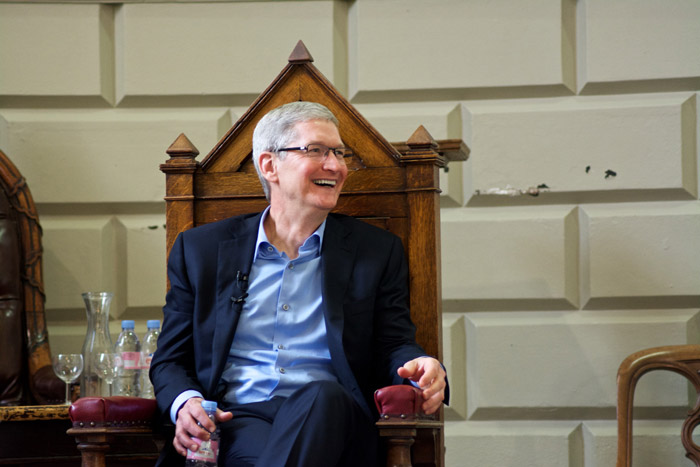
Tim Cook, the CEO of Apple, spoke to the University Philosophical Society (the Phil) this morning, receiving the society’s Gold Medal of Honorary Patronage.
A crowded Exam Hall – which Cook seemed awestruck by – heard him talk about how Ireland, for Apple, is a country “that is very much like home”. He spoke about human rights, education and privacy, and being the openly gay CEO of the world’s largest company.
Before the iPhone, iPad and iPhone – and before the Mac – Apple opened its office in Cork 35 years ago, he said.
“I initially came to Cork in my very first month as an Apple employee, almost 18 years ago”, Cook said. With 5000 employees in Cork, Apple is the county’s largest private employer, and Cook announced this morning that they are to expand its workforce such that it’ll reach over 6000 – which would represent more than a quarter of its European workforce.
Cook said that Apple was “rooted here and deeply so” – and there wasn’t a sense that he was just playing to the audience.
Diversity, human rights – like Apple’s focus on privacy – and education were a running thread throughout Cook’s talk and in the audience questions which followed. “We believe that education is a fundamental human right. We also believe it is the most profound way to shape our future”, he said.
Cook also knew his Trinity history. Speaking in a local context, he said: “Stepping in through the Front Arch this morning and looking across campus, I was gratified by the changes you could see all around. For centuries, men and women, Catholics and Protestants, couldn’t walk through this arch and study together.” Speaking of the change since then, and the diversity of Trinity’s students, be it language, religion or perspective, he noted that “none of it happened by accident.”
“It takes courage to overcome oppression”, he said. “Imagine the impact that you, your unique experience, your viewpoint and your vision can have on the world.”
And Apple’s vision for the world is represented in its products and what people can do with them, and it imbues certain values in the way it does things, like its commitment to privacy.
With regards to Apple’s commitment to human rights and privacy in a more practical sense, I asked Cook a question about a bill that is under consideration by the UK parliament regarding the introduction of new surveillance powers, and specifically a part of it which would seemingly ban a type of encryption known as end-to-end encryption. Apple’s popular messaging service iMessage was built with it as part of its fundamental architecture, meaning that only the sender and receiver can possibly know what a message says. More directly, I asked Cook what Apple will do with iMessage if the UK does ban end-to-end encryption.
“The intention of the government is a very good intention. The intention is national security. All of us say we want to be secure. The problem is that the reality of today is that there are hackers everywhere – people who want to take your data. There are bad governments in the world. There are bad people in the world. If you leave a backdoor in the software, then there is no such thing as a ‘backdoor for good guys only’. If there is a backdoor, anybody can come in.”
“From a privacy point of view, we take a view on privacy that says your personal information if yours. It’s not ours”, he said.
“We’re going to continue to encrypt end-to-end, with no back door, and we will work productively with the governments to try and convince them that that is also in their best interest, in a national security sense as well, because we strongly believe that it is.”
Responding to a question from an audience member – who pointed out that it was almost rude not to be gay if you’re a member of the Phil – regarding Apple and Cook’s soft power with regards to LGBT rights, Cook said: “I don’t think about power. That’s a word that I’m not fairly comfortable with”. The late Steve Jobs, Cook’s predecessor as CEO of Apple, when asked about the responsibilities of power, famously said “Power? What is that?” – and there definitely was a sense that Cook’s reply wasn’t an accidental mirroring.
Cook spoke about how he valued his privacy “in an exaggerated way, compared to most people”. Sometime after becoming CEO, he said, it became clear to him that he could help “some number of people” by being more public about his sexuality.
“There would be no amount of donation that I could ever make that would influence people as much as me just standing up and saying ‘I’m proudly gay’”, he said. “So that’s the reason I did it. I think we need more people to do it.”
Whether it was commenting on the gender imbalance of the all-male busts in the Long Room library or on the walls of the Phil’s Council room, or quoting from Oscar Wilde, Cook seemed to be remarkably in tune with the audience. There was no way that Cook acted like the CEO of the world’s largest company, a company that has had the most profitable quarter of any company, ever. While the two full rows of an entourage and the line of black cars in Front Square shattered the down-to-earth illusion just a little, Cook’s humility and engagement had me convinced that he deeply cares about Apple, its products and its customers – and how the intersection of all those has an impact on the world. And he wanted the audience to know it.






